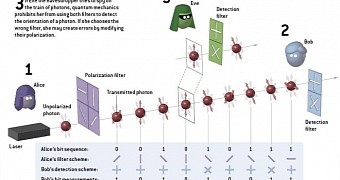Before it even had a chance to be deployed within real-world applications, a group of Swedish scientists have already found a way to break quantum cryptography, a novel, advanced concept for encrypting data using the law of physics themselves.
First proposed in the '70s, quantum cryptography is an advanced cryptography model that relies upon photon movements to safely transmit data.
For many years, theoreticians said that this method is unbreakable, and will not allow others to eavesdrop on traffic encrypted with quantum key distribution (QKD) methods.
Some companies have started work on commercially available QKD devices, but few have been actually used outside test environments.
According to researchers from Linköping University and Stockholm University, there's a loophole in how energy-time entanglement-based quantum encryption works that puts QKD devices at risk.
Quantum cryptography can be attacked, not invincible as previously thought
"With this security hole, it's possible to eavesdrop on traffic without being detected. We discovered this in our theoretical calculations, and our colleagues in Stockholm were subsequently able to demonstrate it experimentally," one of the researchers said for EurekAlert, a science journal.
In quantum cryptography, the two parties send a photon at each other at the exact same time, but also add a small phase shift at each side. If there's somebody eavesdropping on the exchange, there will be noise in the communication channel, and the phase shift will be smaller, if not, the photons use the phase shift itself as an encryption key.
In their tests, the researchers discovered that data integrity can only be assured if the two parties communicating with each other use a photon source, and not traditional light sources.
The scientists published their findings in high detail online, on the free ScienceMag portal, along with two mitigation techniques that can be used to avoid data corruption.

 14 DAY TRIAL //
14 DAY TRIAL //